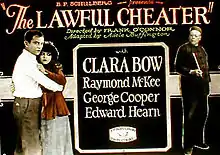The Lawful Cheater
The Lawful Cheater, sometimes referred to as Lawful Cheaters, is a 1925 American silent crime-drama film written by Frank O'Connor and Adele Buffington The film was directed by O’Connor for B.P. Schulberg Productions, and starred Clara Bow, David Kirby, and Raymond McKee.[1][2] After its 1925 U.S. theatrical release, the film was banned by the British Board of Film Censors.[3]
| The Lawful Cheater | |
|---|---|
 Theatrical release poster | |
| Directed by | Frank O'Connor |
| Produced by | B.P. Schulberg |
| Written by | Adele Buffington Frank O'Connor |
| Starring | Clara Bow David Kirby Raymond McKee |
Production company | |
| Distributed by | Al Lichtman Preferred Pictures |
Release date |
|
Running time | 1492.91 m (5 reels) |
| Country | United States |
| Language | Silent (English intertitles) |
Plot
Molly Burns (Clara Bow) is a young woman whose indiscreet behavior causes her to be caught and jailed in a police "round up" of suspicious characters. Her prison experience causes her to reflect upon and reform her own life. She convinces jail authorities that her two brothers and her boyfriend could be dissuaded from a life of crime. After her early release, she attempts to reform her indiscreet friends.
Cast
- Clara Bow as Molly Burns
- David Kirby as Rooney
- Raymond McKee as Richard Steele
- Edward Hearn as Roy Burns
- George Cooper as Johnny Burns
- Fred Kelsey as Tom Horan
- Gertrude Pedlar as Mrs. Perry Steele
- Jack Wise as Graveyard Lazardi
- John T. Prince as Silent Sam Riley
- Gilbert Roland as Undetermined Role (uncredited)
Reception
In American film cycles: the silent era, the film is called an "offbeat crime drama".[1] In noting the film was a "cheaply produced melodrama" with a storyline that was "slight and trite", Hal Erickson of AllRovi wrote that beyond the film benefitting from actual use of New York City locations, Clara Bow acted as the film's "sole redeeming factor." He noted that at one point in the film, Bow's character of Molly Burns appeared in male drag which even if "far from convincing", was "fun to watch."[5]
See also
References
- Langman, Larry (1998). American film cycles: the silent era. Volume 22 of Bibliographies and indexes in the performing arts: Greenwood Publishing Group. p. 176. ISBN 0-313-30657-5.CS1 maint: location (link)
- Dickens, Homer (1984). What a drag: men as women and women as men in the movies. Quill. p. 103. ISBN 0-688-02626-5.
- Jonathon Green, Nicholas J. Karolides (2005). The encyclopedia of censorship. Infobase Publishing. ISBN 0-8160-4464-3.
- "Lawful Cheaters". Silentera.com. July 12, 2007. Retrieved January 24, 2012. External link in
|publisher=(help) - Erickson, Hal. "Lawful Cheaters (1925)". AllRovi. Retrieved January 24, 2012.